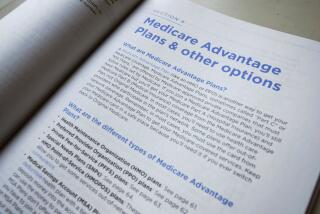Retirees Ill-Prepared to Choose From New Medicare Options
- Share via
America’s retirees are ill-prepared to evaluate the array of Medicare health insurance options that will be open to them in little more than a year, a new survey shows.
Under legislation passed last year, seniors will have to decide whether to absorb the extra cost of staying in traditional Medicare plans--where they can go to any doctor they choose--or switch to one of a variety of new plans with more restrictions on care but lower overall costs. Brochures and advertisements about rival plans will begin to flood mailboxes this fall as health firms compete for the business of the nation’s 38 million Medicare beneficiaries.
According to the survey, conducted by the American Assn. of Retired Persons, 89% of seniors lack adequate knowledge to make an informed decision. Nearly one-third of all Medicare beneficiaries know almost nothing about health maintenance organizations, one of the oldest and most familiar of the options, the survey said. And half of all senior citizens who know virtually nothing about HMOs are enrolled in them. Slightly more than half don’t understand the fundamental concepts behind HMOs or other managed-care options.
About 51% recognize that a “primary-care provider” is an individual’s regular doctor who makes referrals to specialists when necessary, and about 55% of Medicare beneficiaries understand the notion of a “network,” or list of doctors who provide services to individuals enrolled in certain plans.
“We are in favor of greater choice,” said Tricia Smith, a senior lobbyist for the AARP, “but it only works if you have informed consumers exercising leverage in the marketplace, and we are not there by a long shot.”
Only 11% of Americans got a high enough score to be considered able to make informed decisions about Medicare choices, according to two researchers at the University of Oregon who conducted the study. The survey targeted seniors between the ages of 65 and 80 who live in the five areas of the country where HMOs are most common.
But other recent surveys show the information gap among the elderly was no worse than among the general public.
The Employee Benefit Research Institute, a research group, recently found that 21% of individuals enrolled in managed care recognized that they were in fact participating in such a plan. The Henry J. Kaiser Family Foundation found in November that 38% of all Americans either had never heard of HMOs or were unsure what that term meant.
“The AARP’s research echoes our own findings,” said Nancy-Ann Deparle, administrator of the Health Care Financing Administration. Her administration has been developing a 30- to 40-page Medicare handbook to inform consumers about choices.
The agency has been working with partners, including the AARP, testing a toll-free information number and planning to put information on the Internet.
Congress has allocated $95 million for the program, or about $2.50 per Medicare enrollee.
Researchers said one finding was particularly surprising: Medicare patients who had stayed in traditional Medicare were better informed about the differences between the choices than those who decided to enroll in HMOs.
Karen Ignani, president of the American Assn. of Health Plans, a trade group representing HMOs, said she found that “puzzling.” Industry studies, she said, show HMO enrollees typically are quite clear that “they are choosing a health plan because of cost, and for the comfort of knowing how much money they will be responsible for, and having a network of providers that are accessible.”
* KAISER WON’T COVER VIAGRA: Kaiser Permanente said it won’t pay for the drug Viagra. A1
More to Read
Sign up for Essential California
The most important California stories and recommendations in your inbox every morning.
You may occasionally receive promotional content from the Los Angeles Times.













